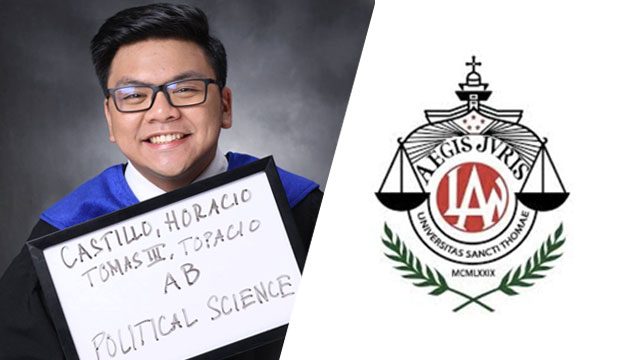SUMMARY
This is AI generated summarization, which may have errors. For context, always refer to the full article.

MANILA, Philippines – The spotlight is once again on fraternities, as the practice of hazing in initiation rites led to another student’s death.
On Sunday, September 17, the body of Horacio Castillo III was found wrapped in a blanket on a pavement in Tondo, Manila. He was declared dead on arrival at the Chinese General Hospital.
Castillo, a freshman at the University of Santo Tomas (UST) Faculty of Civil Law, died due to injuries his parents believe he sustained in fraternity hazing. The father said his son was recruited to the Aegis Juris Fraternity – a recognized organization based in the UST law school. (READ: Aegis Juris fraternity members barred from entering UST)
‘Dynamic and active’ law fraternity
According to its profile on the law school’s website, the fraternity was established in December 1979 by “25 young, idealistic, brave founders.”
Aegis Juris, which literally means “Shield of Justice,” was described as “the most dynamic and active law fraternity” in UST. It is grounded on 5 principles: academic excellence, equality, godliness, integrity, and service.
The fraternity is one of the 8 non-academic organizations within the UST Faculty of Civil Law, and one of the 3 fraternities. Its sister sorority is Regina Legis et Juris Sorority.
“The impressive narrative of this fraternity, born out of a vision almost 3 decades ago, continues to astound and defy all expectations,” the profile reads. “It has weathered its share of gust and storm yet the Aegean knight bearing the shield and the torch with a sword of gold continues on its journey inviting believers to its cause welcoming brothers to its halls.”
As one of the oldest law fraternities in the university, Aegis Juris is said to have produced the largest number of lawyers within the UST Faculty of Civil Law.
It even earned the name “the lawyer factory” for producing many legal professionals working in various government agencies, private companies, and other law firms.
“They are living proof of the quality of lawyers the fraternity contributes to the law profession,” it says.
Its roster of members include current UST law dean Nilo Divina and former Isabela Representative Edwin Uy, both from the Divina and Uy Law Offices, and Court of Appeals Associate Justice Gabriel Robeniol, among others.
‘Do no injustice’

Aegis Juris’ motto – “Do No Injustice, Suffer No Injustice” – is splashed across the top portion of its official website, which could no longer be accessed as of Monday afternoon, September 18.
This call to prevent injustice, however, doesn’t ring true with the death of the fraternity’s latest recruit, a law freshman who, according to his father, was assured that Aegis Juris does not subscribe to hazing.
Divina, in a memorandum released on Monday, placed all members and officers of Aegis Juris under preventive suspension “to ensure unobstructed investigation” into Castillo’s death.
Divina added that they “would not be allowed to enter the campus or the Faculty of Civil Law or attend classes under further orders.”
This is not the first time he had to suspend members of Aegis Juris.
In 2016, some members were suspended following an altercation with members of the Gamma Delta Epsilon fraternity during the bar exams. The fight was attributed to frat rivalry and 7 Aegis Juris brothers were arrested by Manila police.
UST, in a statement regarding the death of Castillo, vowed justice for the student.
“We condemn in no uncertain terms hazing in any form or manner. Violence has no place in an academic institution, particularly in the University of Santo Tomas that values and promotes charity and compassion,” it said.
“We will leave no stone unturned to ensure that the perpetrators be meted the appropriate sanctions and brought to justice,” UST added.
Deaths despite anti-hazing law
The 22-year-old Castillo joins the long list of students killed in hazing, which has long been practiced in organizations across the Philippines despite the existence of the Anti-Hazing Law. (READ: What’s happening to hazing cases in the Philippines?)
Passed in 1995, the law stemmed from the death of Ateneo law student Leonardo “Lenny” Villa in 1991.
But there is only one conviction after 22 years.
In 2015, the Supreme Court (SC) found two members of Alpha Phi Omega fraternity guilty of violating the law for the hazing and death of University of the Philippines Los Baños student Marlon Villanueva in 2006. – Rappler.com
Add a comment
How does this make you feel?
There are no comments yet. Add your comment to start the conversation.